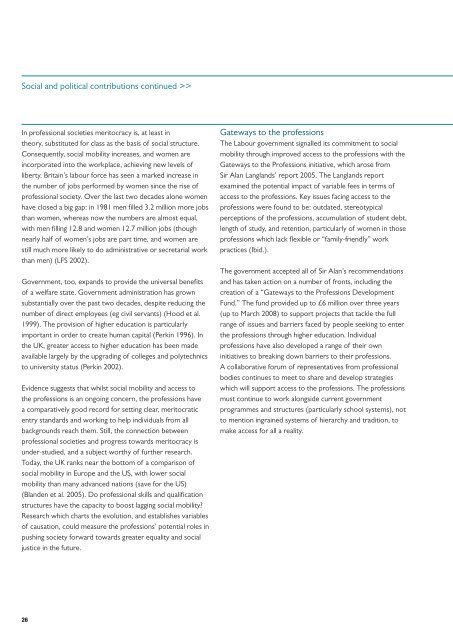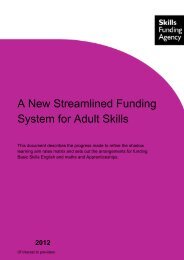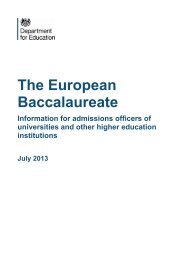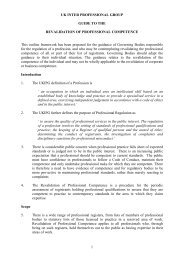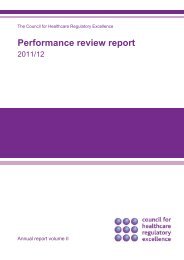BRITISH PROFESSIONS TODAY: THE STATE OF ... - Property Week
BRITISH PROFESSIONS TODAY: THE STATE OF ... - Property Week
BRITISH PROFESSIONS TODAY: THE STATE OF ... - Property Week
Create successful ePaper yourself
Turn your PDF publications into a flip-book with our unique Google optimized e-Paper software.
Social and political contributions continued >><br />
In professional societies meritocracy is, at least in<br />
theory, substituted for class as the basis of social structure.<br />
Consequently, social mobility increases, and women are<br />
incorporated into the workplace, achieving new levels of<br />
liberty. Britain’s labour force has seen a marked increase in<br />
the number of jobs performed by women since the rise of<br />
professional society. Over the last two decades alone women<br />
have closed a big gap: in 1981 men filled 3.2 million more jobs<br />
than women, whereas now the numbers are almost equal,<br />
with men filling 12.8 and women 12.7 million jobs (though<br />
nearly half of women’s jobs are part time, and women are<br />
still much more likely to do administrative or secretarial work<br />
than men) (LFS 2002).<br />
Government, too, expands to provide the universal benefits<br />
of a welfare state. Government administration has grown<br />
substantially over the past two decades, despite reducing the<br />
number of direct employees (eg civil servants) (Hood et al.<br />
1999). The provision of higher education is particularly<br />
important in order to create human capital (Perkin 1996). In<br />
the UK, greater access to higher education has been made<br />
available largely by the upgrading of colleges and polytechnics<br />
to university status (Perkin 2002).<br />
Evidence suggests that whilst social mobility and access to<br />
the professions is an ongoing concern, the professions have<br />
a comparatively good record for setting clear, meritocratic<br />
entry standards and working to help individuals from all<br />
backgrounds reach them. Still, the connection between<br />
professional societies and progress towards meritocracy is<br />
under-studied, and a subject worthy of further research.<br />
Today, the UK ranks near the bottom of a comparison of<br />
social mobility in Europe and the US, with lower social<br />
mobility than many advanced nations (save for the US)<br />
(Blanden et al. 2005). Do professional skills and qualification<br />
structures have the capacity to boost lagging social mobility?<br />
Research which charts the evolution, and establishes variables<br />
of causation, could measure the professions’ potential roles in<br />
pushing society forward towards greater equality and social<br />
justice in the future.<br />
Gateways to the professions<br />
The Labour government signalled its commitment to social<br />
mobility through improved access to the professions with the<br />
Gateways to the Professions initiative, which arose from<br />
Sir Alan Langlands’ report 2005. The Langlands report<br />
examined the potential impact of variable fees in terms of<br />
access to the professions. Key issues facing access to the<br />
professions were found to be: outdated, stereotypical<br />
perceptions of the professions, accumulation of student debt,<br />
length of study, and retention, particularly of women in those<br />
professions which lack flexible or “family-friendly” work<br />
practices (Ibid.).<br />
The government accepted all of Sir Alan’s recommendations<br />
and has taken action on a number of fronts, including the<br />
creation of a “Gateways to the Professions Development<br />
Fund.” The fund provided up to £6 million over three years<br />
(up to March 2008) to support projects that tackle the full<br />
range of issues and barriers faced by people seeking to enter<br />
the professions through higher education. Individual<br />
professions have also developed a range of their own<br />
initiatives to breaking down barriers to their professions.<br />
A collaborative forum of representatives from professional<br />
bodies continues to meet to share and develop strategies<br />
which will support access to the professions. The professions<br />
must continue to work alongside current government<br />
programmes and structures (particularly school systems), not<br />
to mention ingrained systems of hierarchy and tradition, to<br />
make access for all a reality.<br />
26


